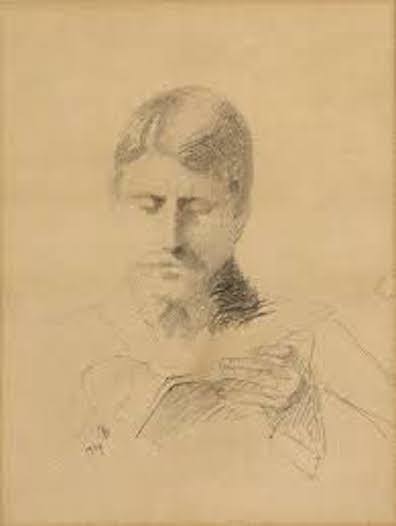Born to Protestant parents in Derry in 1872, Best was
educated at a grammar school called Foyle College in Derry but
did not attend any university. Some inherited money allowed
him to quit his job in a bank and travel to Paris, where he
became friends with John Millington Synge. Synge
recommended that he attend the lectures of Henri d'Arbois de
Jubainville at the Collège de France, and Best later
translated and annotated Jubainville’s Le Cycle
Mythologique Irlandais et la Mythologie Celtique (1884).
Early in the library chapter, Best approaches Eglinton to tell
him that Haines has left to buy Hydes's Lovesongs of
Connacht and to say, "I was showing him Jubainville's
book." Given the fact that the translation was published
in 1903, it seems likely that Best has been showing Haines his
English version of the scholarly work. Later in the chapter he
is seen "raising his new book," which could be this
recently published translation but alternatively might be the
"notebook" that he is seen carrying about.
Best first appears at the moment when Stephen and John
Eglinton are discussing "schoolboys." In a bit of narrative
legerdemain, he pops into view just then as a living,
breathing illustration: "Mr Best entered, tall, young,
mild, light. He bore in his hand with grace a notebook, new,
large, clean, bright." These two sentences appear to
echo the account of the young man that George Moore
offered in the tell-all memoir Hail and Farewell
(1911-1914) that he published after leaving Dublin for London:
"A young man with beautiful shining hair and features so fine
and delicate that many a young girl must have dreamed of him
at her casement window, and would have loved him if he had not
been so passionately interested in the infixed pronoun."
Joyce, like Moore, presents Best as a delicate young man––even
though Joyce was only 22 at the time presented in the novel
and Best was 32.
(Nor was he uninterested in women. He married accomplished
pianist Edith Oldham in 1906 and remained with her until her
death in 1950. The Blooms and Barnacles website
(www.bloomsandbarnacles.com) notes that the couple "helped to
establish the Feis Ceoil music competition in 1896. Best saw
great promise in young Joyce as a tenor and encouraged him to
enter the competition. Best and famed singer John McCormack
spent several evenings preparing the young Artist for his
performance. Joyce competed in the 1904 Feis Ceoil, where he
shared the stage with McCormack. Best would be punished for
his generosity by inclusion in one of the most famous novels
of the twentieth century.")
Joyce's Best is "amiable," "unoffending," "innocent,"
"smiling"––and more than a little dim. He shows no trace of
Eglinton's malice toward Stephen, but on the contrary seems
eager to help move the conversation along. Even when doing so,
however, his contributions feel childlike and undiscerning. He
gets "the wrong sow by the lug" in response to Stephen's
theory of father-son atonement, and in general struggles to
follow the lecturer's logic. When Stephen refers to
Shakespeare being seduced in a cornfield, Best does offer an
apt Elizabethan corrective. But in fact there is nothing to
correct––the word "cornfield" is used in the song he
quotes––and the narrative undercuts him with adverbs:
— Ryefield, Mr Best
said brightly, gladly, raising his new book, gladly,
brightly.
He murmured then with blond
delight for all:
Between
the acres of the rye
These pretty countryfolk would lie.
Other observations are less apt. Best admired Oscar Wilde,
and his fictive avatar mentions Wilde's biographical study of
Shakespeare: "— The most brilliant of all is that story
of Wilde's, Mr Best said, lifting his brilliant notebook. That
Portrait of Mr W. H. where he proves that the
sonnets were written by a Willie Hughes, a man all
hues." Lyster interjects, "For Willie Hughes, is it not?"––a
significant change of prepositions! Best seems barely to
register the significance: "— I mean, for Willie Hughes,
Mr Best said, amending his gloss easily. Of course it's all
paradox, don't you know, Hughes and hews and hues, the colour,
but it's so typical the way he works it out. It's the very
essence of Wilde, don't you know. The light touch." (Stephen's
unspoken comment is annihilating: "a blond ephebe. Tame
essence of Wilde." Greek ephebes were 18-20 years old.
Best is not.)
Best was fluent in French, and his character's most
interesting contributions to the Shakespeare discussion come
from his familiarity with that language and culture. When
Russell mentions Mallarmé, Best recalls "those wonderful prose
poems Stephen MacKenna used to read to me in Paris. The one
about Hamlet. He says: il se promène, lisant au
livre de lui-même, don't you know, reading the book
of himself." This perceptive response to Shakespeare's
prince anticipates the sublime solipsism that Stephen will
later attribute to the playwright: "He found in the world
without as actual what was in his world within as possible.
Maeterlinck says: If Socrates leave his house today he
will find the sage seated on his doorstep. If Judas go forth
tonight it is to Judas his steps will tend. Every life
is many days, day after day. We walk through ourselves,
meeting robbers, ghosts, giants, old men, young men, wives,
widows, brothers-in-love, but always meeting ourselves."
Another apt French contribution to the Shakespeare theory is
comically accidental. When Stephen extends the father-son
logic of Hamlet into the ways the playwright
represented "his daughter's child" in the late romances, Best
thinks of L'art d'être grandpère, a book of children's
poems by Victor Hugo: "— The art of being a grandfather,
Mr Best gan murmur. L'art d'être grand..."
By itself the allusion seems largely irrelevant, but by making
Stephen cut into Best's irrelevant association and slice off
his final syllable, Joyce lets him coin a resonant motto for
Stephen's psychobiographical aesthetic. Making magnificent
drama out of the painful materials of one's sexual and
familial life, as Shakespeare did, is "the art of being
great."
Joyce brings Best back for an encore in Circe "in
hairdresser's attire, shinily laundered, his locks in
curlpapers." The reference to what Moore called
the man's "beautiful shining hair" is intended also to evoke
his merely aesthetic preoccupation with beauty, divorced from
any intellectual heft, because as Best recounts how he has
been giving Eglinton a makeover he commits another literary
blunder: "I was just beautifying him, don’t you know. A
thing of beauty, don’t you know, Yeats says, or I mean,
Keats says."



